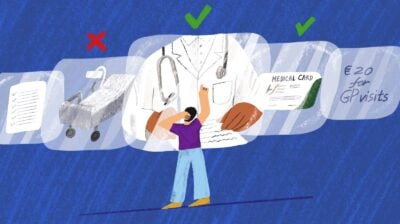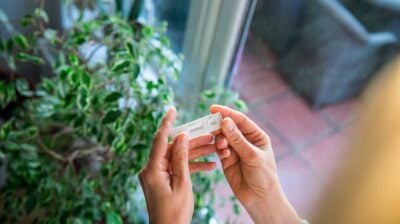Should I take health supplements?
Learn more about health supplements and whether they would be beneficial in your diet

Vitamins and minerals are essential nutrients needed for the proper functioning of our bodies. For the majority of us, except when pregnant, eating a healthy balanced diet gives us our total daily requirements of nutrients and supplements are not normally recommended. If you choose to take supplements, taking too many or taking them for too long could be harmful to your health.
What are health supplements?
Health supplements include vitamins, minerals, herbals and botanicals, amino acids, enzymes and many other products. They come in the various different forms forms such as tablets, capsules and powders, as well as drinks and energy bars.
Click here for further information on protien supplements.
Who should take supplements?
Eating a healthy and balanced diet will give us most of the vitamins and minerals we need. However there are two exceptions:
- All people who might become pregnant should take a folic acid supplement everyday. This will help to prevent neural tube defects (e.g. Spina bifida) in the event of pregnancy.
- A vitamin D supplement of 5-10 micrograms should be taken everyday to support good bone health. There are very few food sources of vitamin D, so a supplement helps us to meet our vitamin D needs
Folic acid supplements and pregnancy
From the time that you first get your period until your last period it is recommended that you take folic acid incase you become pregnant. Folic acid can help to prevent neural tube defects such as spina bifida. When taking folic acid for pregnancy, the current recommendation from the Food Safety Authority of Ireland is that you take 400 micrograms (mcg) every day from before you are pregnant until up to 12 weeks pregnant.
Vitamin D
It is also recommended that you take vitamin D when pregnant. Vitamin D regulates the amount of calcium and phosphate in the body which are needed to keep bones and teeth healthy. If a pregnant person does not have enough vitamin D during pregnancy or while breastfeeding the baby will use the their parent’s calcium reserves to ensure that they are born with enough stores of nutrients. This means that the parent’s bones will suffer and not the child’s.
Our bodies naturally make vitamin D when our skin is exposed to sunlight between May and September. However, given Ireland’s latitude, we do not get sufficient UV sunlight from October to April. To reduce skin cancer risk, it is important not to expose the skin to excess sunlight.
The safest way of getting enough vitamin D is through food and supplementation. Vitamin D containing foods include oily fish (like tuna, mackerel and salmon), eggs, fortified dairy products, and red meat. If you have dark skin (for example from Africa, African Caribbean or south Asian origin), more sun exposure is required to make the same level of vitamin D and you have a higher risk of not having enough vitamin D. If you are worried about whether you are getting enough vitamin D you should talk to your doctor or pharmacist about taking daily supplements.
What vitamins does my body need?
We need 13 vitamins to stay healthy, these are vitamin A, C, D, E, K, and the eight B vitamins. Each vitamin has a different vital role in our body. Vitamin C helps to keep cells healthy, vitamin A is important to maintain healthy eyesight and healthy skin, vitamin D helps to regulate calcium and is needed for strong bones and teeth, vitamin E is needed to maintain cell structure, and vitamin K helps to make our blood clot.
Vitamin B
There are 8 B vitamins, they are B1, 2, 3, 5, 6, 7, 9, and 12.
- Vitamin B1 (Thiamine) helps the body turn food into energy.
- Vitamin B2 (Riboflavin) helps your body build red blood cells and helps break down proteins, fat and carbohydrates. It supports other functions of your cells that give you energy.
- Vitamin B3 (Niacin) every part of your body needs vitamin B3 to function properly, it helps enzymes to do their job of converting food into energy
- Vitamin B5 (pantothenic acid) is necessary for making blood cells and helps convert food into energy
- Vitamin B6 (pyridoxine) is needed for proper brain development. It helps make the hormones serotonin, which regulate our mood, and norepinephrine which helps our bodies cope with stress.
- Vitamin B7 (biotin) helps to keep your skin, hair, eyes, liver and nervous system healthy.
- Vitamin B9 (folic acid) helps proper brain function and is important for mental and emotional health.
- Vitamin B12 (cobalamin) needed for nerve tissue health, brain function and the production of red blood cells.
What foods give me the vitamins I need?
Here are some examples of some of the food sources you can find your daily vitamins in:
- Vitamin A: Liver and fish oils, eggs, milk and leafy green vegetables
- Vitamin C: Citrus fruits such as orange, kiwi and lemons
- Vitamin D: Fatty fish like tuna and salmon, eggs and milk – especially fortified varieties.
- Vitamin E: Vegetable oils, nuts and seeds
- Vitamin K: Green leafy vegetables such as spinach, lettuce and cabbage
Vitamin B
- Vitamin B1: Pork, poultry, peas and nuts
- Vitamin B2: Egg yolks, red meat, salmon and tuna
- Vitamin B3: Meat, poultry, fish and bread
- Vitamin B5: Avocado, cheese, broccoli and almonds
- Vitamin B6: Chickpeas, bananas, brown rice
- Vitamin B7: Cauliflower, mushrooms, eggs, nuts
- Vitamin B9: Avocado, leafy green vegetable and brussel sprouts
- Vitamin B12: Meat, poultry, dairy products and eggs
If you choose to take health supplements it is important to speak to you GP beforehand as to understand all the implications that they may have on your health. For further information about creating a balanced diet click here.






